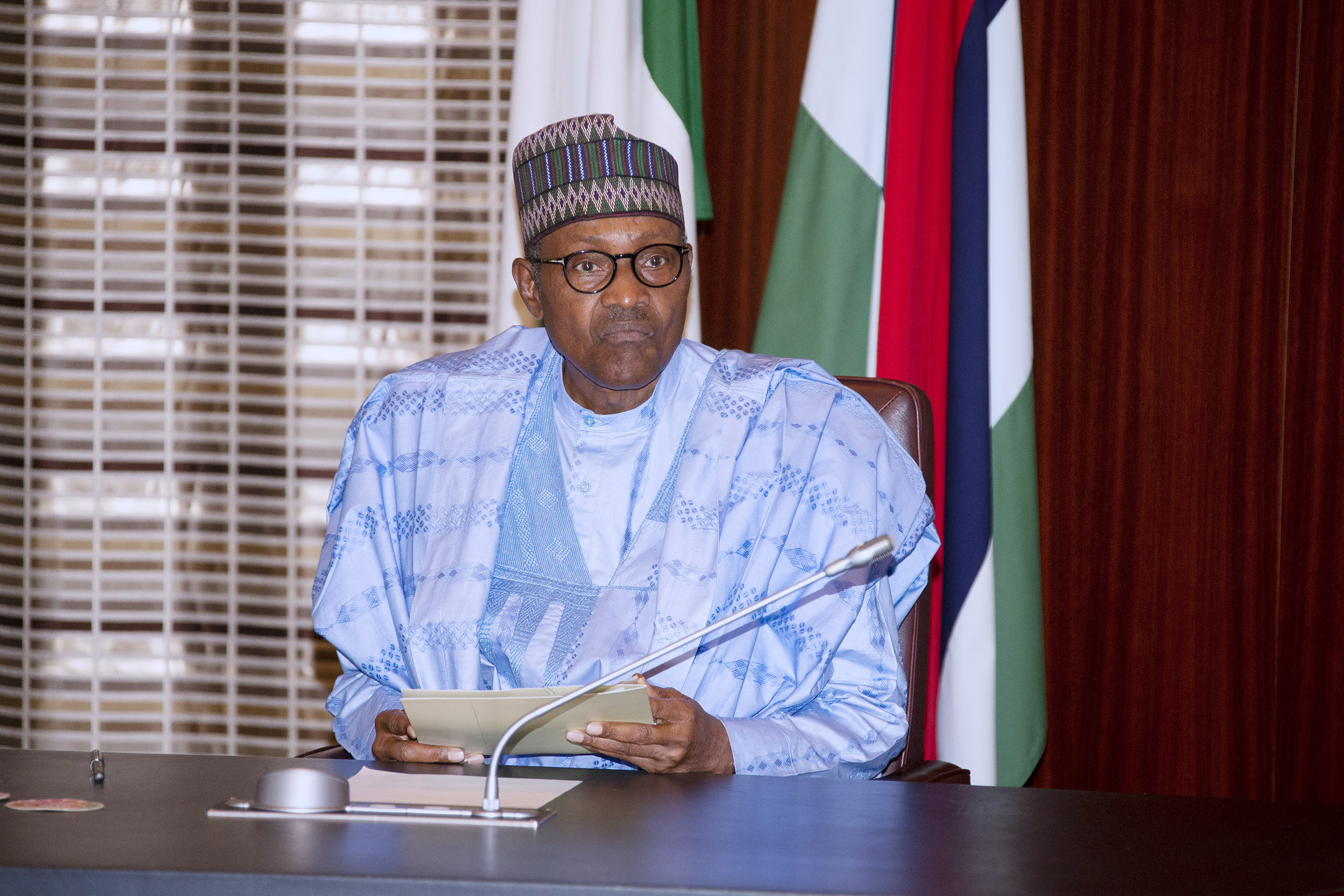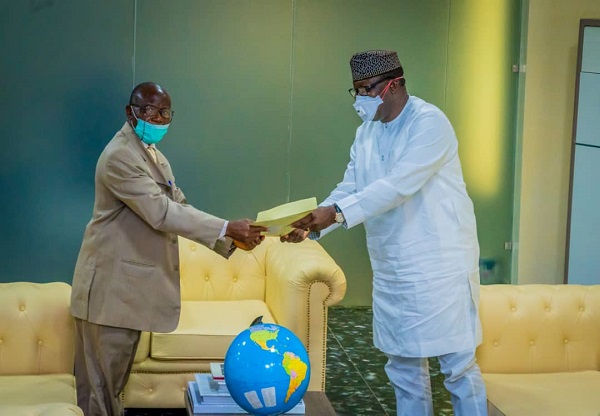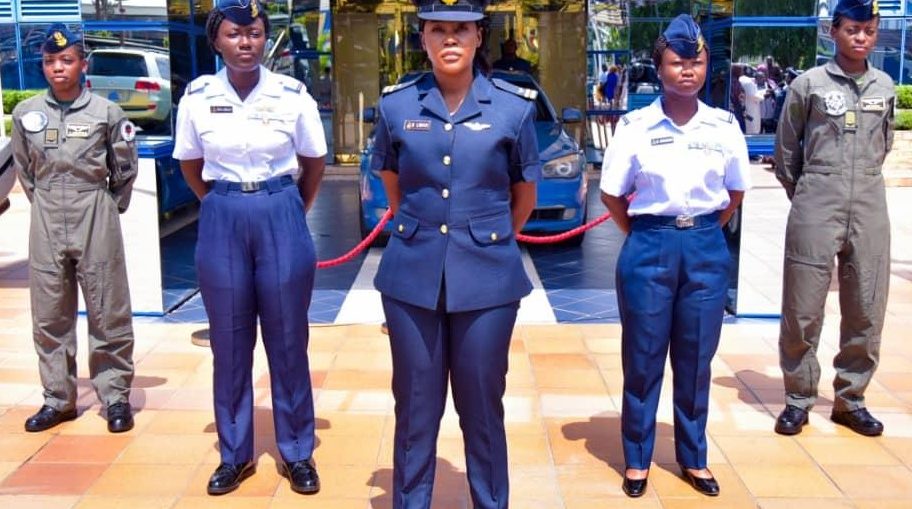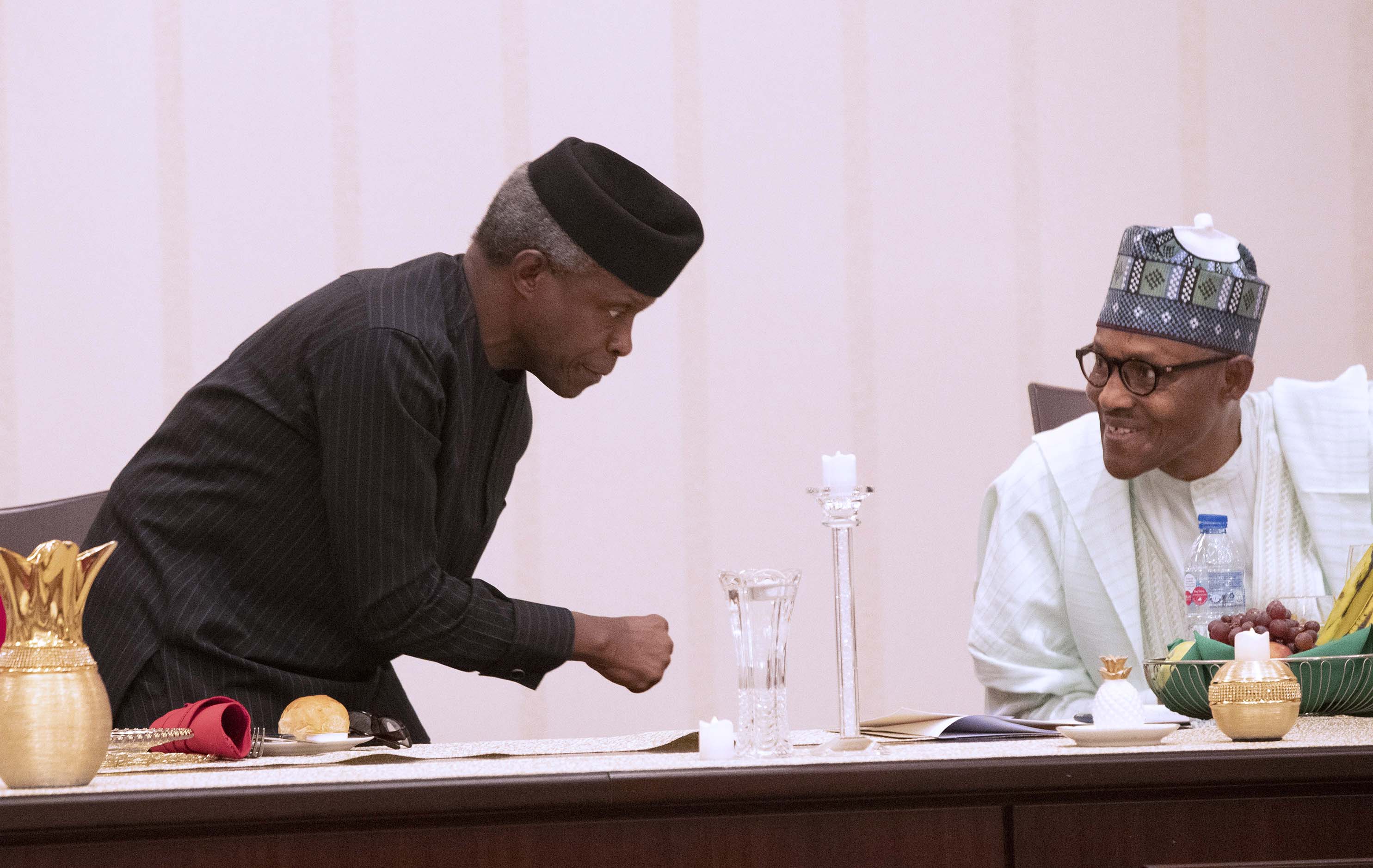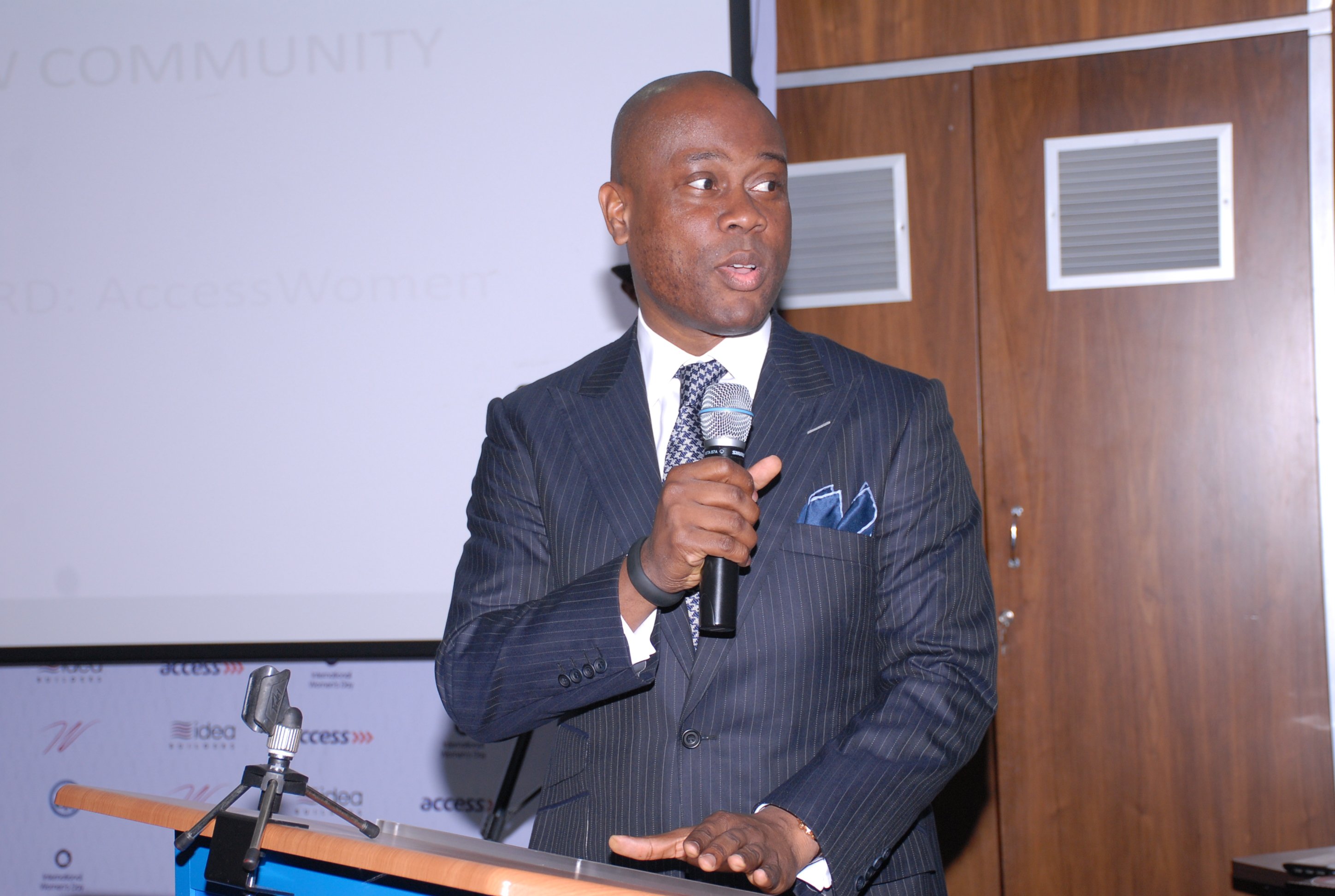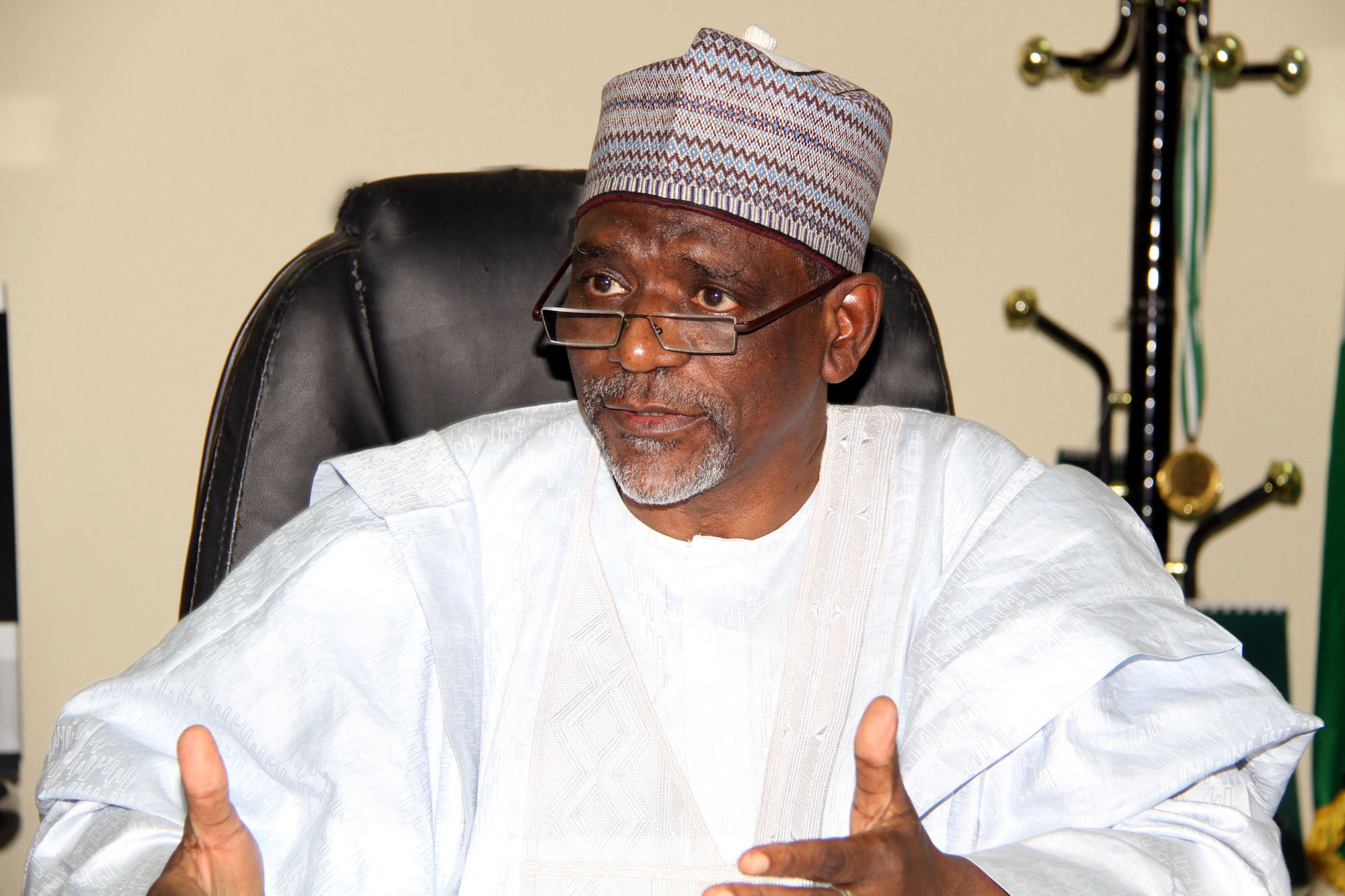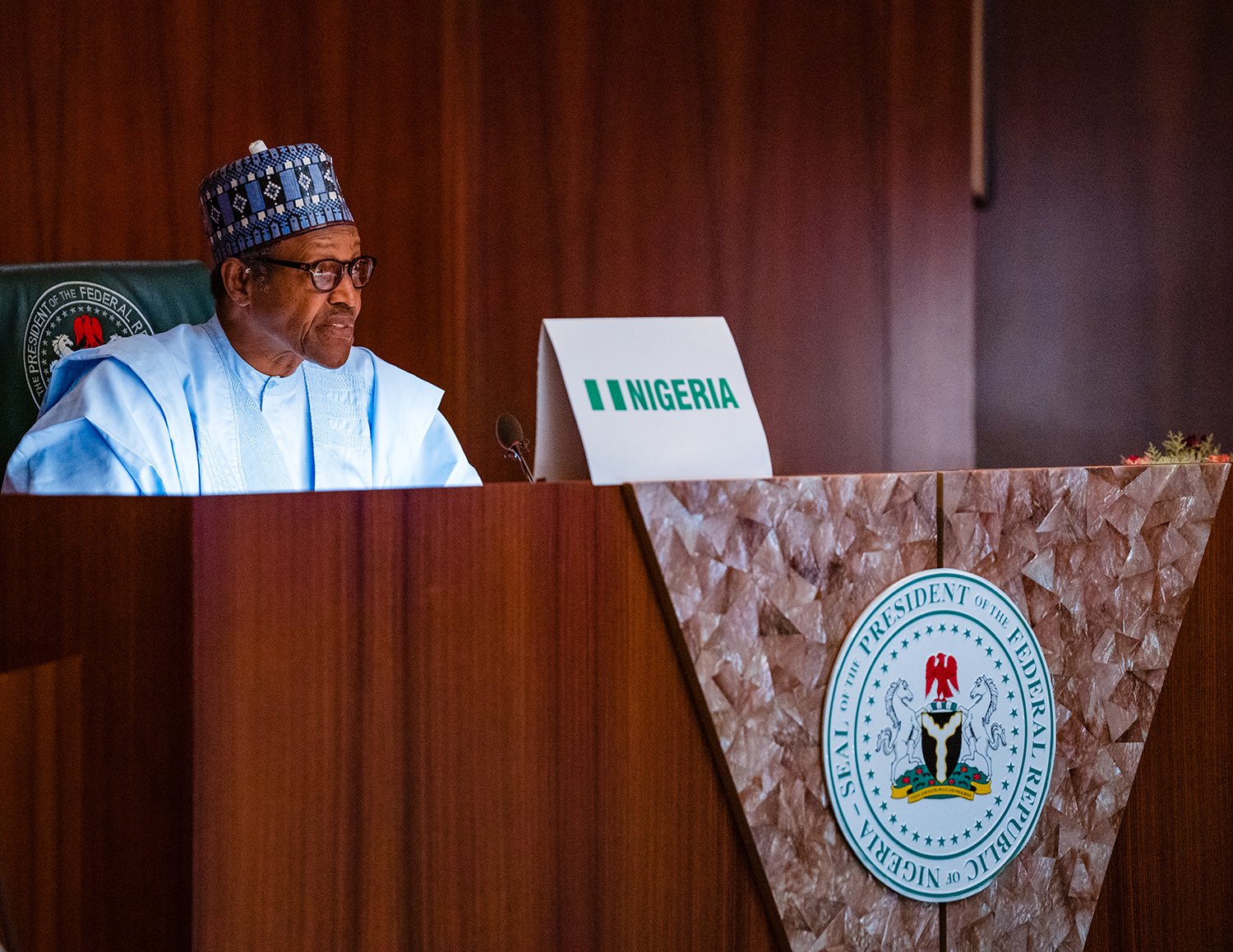PRESIDENT BUHARI RECEIVES ILO TEAM 0A&B; President Muhammadu Buhari addresses the Director-General of International Labour Organisation, (ILO), Mr Guy Ryder and his team during an audience with the President at the State House Abuja. PHOTO; SUNDAY AGHAEZE. AUGUST 1 2019.
On the 30th of April, 2020 news filtered out that President Buhari had given final approval for the implementation of the Steve Oronsaye committee report; a report which was commissioned by late President Umaru Musa Yaradua to look into the proliferation of government agencies, many with duplicated or lavishly overlapping functions. At some point, the figure we had was 541 of them, whose effects were almost unfelt by the citizens of Nigeria. Since that time, a few more parastatals had been created since their prime movers managed to justify their existence and urgency through our political system. New institutions are often rammed through the system using political power. Oftentimes, these institutions start as temporary solutions to pressing problems, but we know that given an inch, Nigerians prefer to take the mile. Temporary institutions soon start shopping for ultramodern headquarters to buy, with concomitant heavy deals, and employment into them become political favours to powerful men who will guarantee the existence of such agencies into perpetuity. Another moribund agency is born, to suck on the thinning lifeblood of a nation laid prostrate.
I also recall that it was the same Oronsaye, given free rein by President Yar’Adua who introduced an 8 years tenure for permanent secretaries and directors in all of those agencies. I know people who hate Yaradua’s guts for the reforms he tried to bring to the service. Oronsaye himself got cooked for some underhand deals he made while Head of Service. His cases are probably still ongoing or left in the cooler for anytime he says something untoward or starts to feel comfortable. Umaru Musa Yar’Adua, coincidentally died exactly 10 years ago, after a battle with ill-health. Many who occupy seats in government today, as well as those in civil society, had teamed up to hound the gentleman president out of office. We did not see what he tried to do then, and the fact that he died a hero for this country. Yar’Adua did halt some privatization deals he felt were fraudulent, reverted VAT from 10% to 5% and Petrol prices from N75 back to N65 in defiance of his boss, Olusegun Obasanjo, who had increased these on his way out. These may be controversial but what was not controversial was that he rejected offers from abroad to purchase ammunition to level up the Niger Delta area and pave way for exploration of crude oil at the price of human lives. He chose to do the unthinkable by inviting militants to Aso Rock for an amnesty ceremony. I recall those boys weeping as they shook his hands that day.
A few governments have come and gone since the Oronsaye Report was submitted. But Nigeria has now hopefully arrived at a junction where we need to do the needful. With a collapsed revenue profile in the middle of a global health and economic meltdown, Nigeria has hopefully finally received the memo that we cannot continue along our profligate ways. The current government is saddled with the implementation of the Oronsaye Report – as amended – as part of efforts to streamline expenditure and save Nigeria from tipping over into a painful fall off a fiscal cliff. The questions are; can we really help ourselves? Will this effort not be hijacked by political considerations? Is the Oronsaye Report flawless and if not, what will be done about the flaws? More importantly perhaps is the question of whether indeed our public service is too large as most people believe or whether it is instead merely dysfunctional, inefficient, top heavy, skewed and distended in a funny manner, and lacking in focus on service delivery and service excellence towards the people.
I will also add, that Nigeria should be careful about shrinking when we should be expanding. This is certainly not the time to be folding over and crawling into our shells. Every nation is faced with the binary option; to shrink in fear, and risk being killed wholesale by Covid19 and its economic after effects, or to stare down the disease and position to be a winner afterwards, by tapping into inner strength in order to emerge bigger, stronger, more determined, when all this is over. I will continue to urge Nigeria to join the latter group as I have in all my articles since this COVID saga started. We can already begin to position as winners by engaging our mental faculties in the few meetings that are going on, online and offline. I have continued to tell people, that critical meetings are ongoing, and a handful of important people are still running the country. I have made myself very available because I love to be part of any solution. I am not very good with articulating problems and why things will not work. From get go I have told anyone who cares to listen that this is not the time to tear each other apart for past mistakes. No right-thinking nation can afford that luxury at present. If there is a time for national unity – and even the unity of whole races and continents, nay the world, this is it!
Advertisement
Let us attempt some answers and suggestions to some of the above questions. These are the issues that government must have in mind as it implements the Oronsaye Report. Most of the issues are known to government anyway, but they bear reiteration, just so that we get our input into the policy formation as outsiders and ordinary members of the public:
- MINIMISE JOB LOSS – Whatever the government does, we must ensure that the exercise does not necessarily result in mass job losses. As the government as shown with the interventions proposed for MSMEs and others, this is a time to ensure that people continue to have some income from month to month. Inflation will spike, and the economy may stagnate at the same time if we are not careful. Sending people out into the unemployment market at this time will be counterproductive, procyclical and it will deepen an already debilitating crisis. It is important to quickly speak up on this because the implementation is likely to be done by people with ‘private sector mentality’ who only see figures and not families and human beings. Chances are that a foreign consulting firm will do the hatchet job. Kadan kadan my people.
- NIGERIA’S PUBLIC SERVICE TOO SMALL – Flowing from the above, is the FACT that indeed Nigeria’s public service is not too large, but too small. I have labored hard to prove this fact in times past. The percentage of the workforce employed in the service is hardly 4% – at federal, state and local government levels, including parastatals. Nigeria’s population is about 200million. Even if 160million, our workforce (people between 18 and 65/70) should be close to 100million. The numbers we have in the entire public service is not up to 4million. Anyone can check that in the USA, 17% of the workforce works DIRECTLY for government. In the UK it is 21%. In most of Europe it is over 20%. In the Scandinavian nations it is an embarrassing 35% on the average. In South Africa it is 17%. The lower the number, the closer a nation is to being a failed state. It is only in Africa that we find figures like 3%, 4%, 8%. This is absolutely critical because COVID19 alone showed how easily nations can deploy assistance to their people given a solid public service system. We have been flailing on this in Nigeria. Our public service hasn’t actually started. See my previous article at https://opinion.premiumtimesng.com/2017/11/14/the-jobs-nigerian-governments-refused-to-create-by-tope-fasua/. It is the strength of the public service that has sustained most countries pulling out of this crisis as winners. The biggest employer in the UK is the National Health Service, which employs at least 1.7million people. See how they took care of their Prime Minister when he was hit by COVID 19?
- ORONSAYE REPORT’S MANY ERRORS – I happen to have worked in a team on the original Oronsaye Report. It was flawed in part. No report can be perfect. Whereas I hope the government works with latter reviews of the same report, it is imperative to quickly point out that the assumptions upon which Oronsaye Report was based circa 2009/10 have broadly shifted today. There is a need for great caution. I recall two events when I worked in that team. When we arrived at National Bureau for Statistics, they had 2,100 staff listed in the report. The Oronsaye Committee questioned why they needed 2,100 staff and recommended the number be pruned massively. I objected. Nigeria has a growing population with vast landmass. We have 774 local governments and almost 10,000 wards made up of perhaps 100,000 villages, towns, cities, settlements etc in this country. What is our real-time statistical coverage of this country? Do we not still rely on foreigners to tell us what is going on in our country? Yes, we can deploy technology, but until we can design or afford precision technology in this area, there is nothing wrong in getting more statisticians to try and cover this country in order to obtain real-time primary data. We could use thousands more at the NBS who will coordinate ad-hoc interns. The UK Office of Statistics has 3,500 staff, in a country of 60million people who are used for centuries, to supplying government with required information for policy planning. Look at us here. The second incidence had to do with the decision of my team members that the EHORECON (Environmental Health Officers Registration Council of Nigeria) be scrapped. I reminded them that that is the ‘wole-wole’ (sanitary inspectors) of old; perhaps the most powerful parastatal at a point. Today, they no longer inspect settlements randomly; they now organize exams and issue certificates. Yes, we love our certificates in Nigeria. I am of the opinion that the old SANITARY INSPECTORS be brought back today. We have too many slums and are now living worse than beasts in some places. We could use 100,000 of them, or more.
- NEED TO EMPHASISE SOME CRITICAL SECTORS – So when I say we needn’t sack people en masse, what do I propose we do with the numbers? There are critical sectors we now need to emphasize. Hopefully senators, reps and top public servants will not continue to hijack our budget for buying their usual frivolities. The focus should now be on the environment as I have discussed above, as well as the health sector (we haven’t yet repositioned our primary health centres even as we are engaged in snazzy activities in Lagos, Abuja and elsewhere on this COVID matter), education (we need teachers for the 13.5million children we must now take off the streets), agriculture and agro-processing, social services, internal and external security (sans the ghost soldiers and ghost policemen) and mass mobilization (we need MAMSER back to help retrain and reorientate our youth and to help take messages to our villages about government plans). If we focus on these sectors we will realise we can easily absorb and retrain those who will have to exit the public service at this time, and even employ a lot more of our youths – university or polytechnic degree is not required for most of these jobs (except for supervisors).
- DISPARITIES IN THE PUBLIC SERVICE – Will the government take this opportunity to address the disparities, the skewness and imbalances in the service? Today’s government’s first activity in 2015 was to abolish the 8-year tenure instituted under Yar’Adua by the same Oronsaye. At some point we heard it had been reinstituted. No one is sure, but I know of some politically unconnected top officers who have been sent packing under the 8-years rule, and others who have remained 12 – 16 years on in roles that could be better served by younger, smarter people. The idea behind the 8-years rule is to create room for growth and a sense of belonging to younger people in the service. I believe in it. There is also the subject of the vast disparity in the remuneration of what they call ‘core service’ and those working in some lucky parastatals. Since the idea is about cutting costs or achieving efficiency, this is a time to determine what to do about this anomaly. Why would a Director in the ‘core service’ earn what a mere Trainee is earning in some parastatal? What do we do? Boost core service salary or reduce what parastatals take home? How do we expect people in core service not to be corrupt when they seem to have been forgotten in a different world?
- TOP-HEAVINESS AND DIASPORAN DISLOCATIONS – There is also the increasing top-heaviness of some parastatals and in fact the entire service. Many were employed based on political considerations and before you know it there are directors and general managers all over the place, many with little or nothing to do. These people are entitled to N50million Toyota Prados or N80million Toyota Landcruisers, items which is liberally sprinkled all over our national budgets despite the rule in the procurement laws that nobody must request for any particular brand. These people are so powerful that nothing can stop them getting their entitlements. Many have several of these appurtenances of office purchased for them with taxpayers money. Nigeria was simply a mad country as we do things that will make sane people’s skins crawl. This is where the money gets spent, not the tiny salaries of fresh graduates who may get the boot if we blindly implement the Oronsaye Report. The small people must be protected, just as the CBN is protecting small staff from philistinic banks who would rather waste them just so that their Managing Directors continue maintaining their world-class private jets and earning their billion naira salaries. It must also be said, that these luxuries enjoyed by top public ‘servants’ is the excuse that elected politicians – such as National Assembly members – hand upon to justify their own demand for luxury. We the people must move against the madness. What do we do to the many underhand allowances and clever benefits paid in our public service depending on who is involved, the political power they wield and how much cash they collect on behalf of the country? What about the almighty corruption, embezzlement and mismanagement? Also some of the dislocations happen when diasporans are headhunted and insist of government matching their dollar-denominated pay structure. Granted. But for some reason, we cannot say their involvement has turned the system around. It is incredibly hard to change this country.
- AN ERA OF ASCETISM. ARE WE READY? – We are heading into an era of ascetism, minimalism, frugality and I wonder if we are ready. I very much doubt. People don’t change that easily. Nigerians aren’t really changing. Our political leaders will be the last to change except if they see something drastic threatening them. Granted that many of them cannot be reunited with their loot and properties abroad at the moment but the moment the coast begins to clear they will jet out and revert to status quo. They have enough stashed abroad already. so if we are implementing Oronsaye Report we must understand that the vulnerable has nothing to fall back on. Nigerians will love to see visible sacrifices on the part of the people they now consider as oppressors.
- A ROLE FOR NIGERIAN YOUTHS – Nigerian youths are still busy throwing ‘savage comments’ and cursing each other out along tribal and religious lines on social media. The role of straightening out this country has never been so heavy on their shoulders. Of note is the fact that we cannot expect old people who grew in a different era to be able to imagine how the new era should look like. Another consideration is that many of these youths have become contaminated; only waiting for their turns to get their hands on the booty. However, the thinking ones amongst them should know that they will bear most of the brunt of what is about to happen, if they don’t step up immediately and be heard. Again Boris Johnson, speaking in September 2019 at the United Nations did admonish that the world will change in shocking manner, and we all had little time to speak up lest we be swept away. Are Nigerian youths working towards an epoch of global respect and relative productivity and comfort? Or just drifting along as the pageant of history pushes them into more oppression? Time will tell. Listen to Boris here and think about the things he said https://www.facebook.com/513634127/posts/10159509028289128/?sfnsn=scwspwa&extid=pIAhwpeSUUrbUZ1R&d=w&vh=i.
Views expressed by contributors are strictly personal and not of TheCable.

